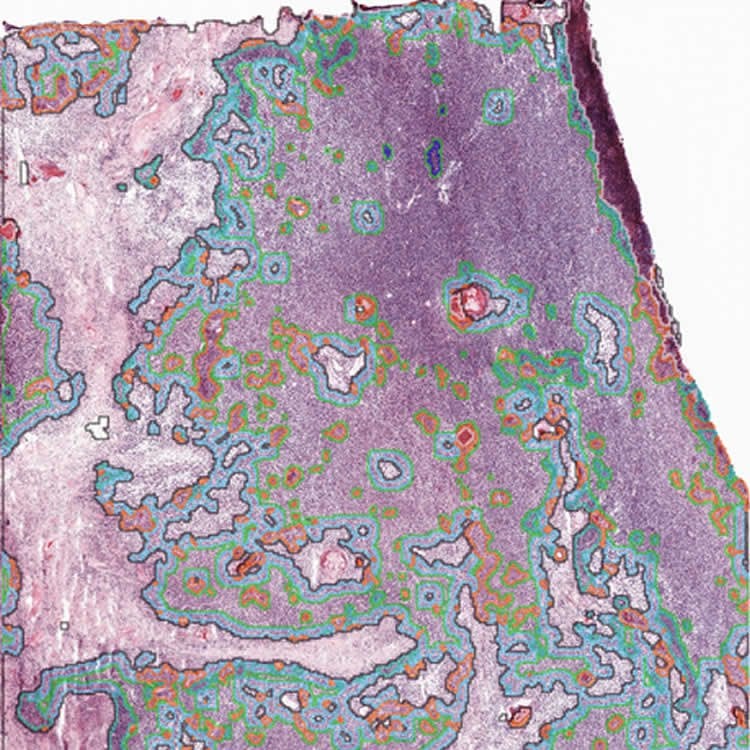Major updates to the Ivy Glioblastoma Atlas Project provide researchers with valuable tools to find cures for aggressive brain cancers.
Robust new data added to the Ivy Glioblastoma Atlas Project (Ivy GAP) changes the scope and impact of this publicly available resource for researchers and clinicians searching for treatments for this most deadly and aggressive of brain cancers, glioblastoma multiforme.
Led by researchers at the Allen Institute for Brain Science and Swedish Neuroscience Institute and funded with a grant from The Ben and Catherine Ivy Foundation, Ivy GAP includes detailed information about genes expressed in the various anatomical regions of glioblastoma and important data about the presumed initial cancer stem cells that lead to tumor formation.
“This atlas has been a long-term partnership to provide a public resource for researchers worldwide to mine the data and identify trends that may lead to further studies and treatments,” says Allan Jones, Ph.D., CEO of the Allen Institute.
“Our ultimate goal is to change the outcome for patients with this devastating disease,” says Ralph Puchalski, Ph.D., scientist at the Allen Institute for Brain Science and co-Principal Investigator on the project. “The Ivy Glioblastoma Atlas Project is an unprecedented platform for exploring the anatomic and genetic basis of glioblastoma at the cellular and molecular levels. The atlas is an anatomic tour de force that is sure to provide vital information into how such tumors grow and invade healthy brain tissue.”

“The need for projects like the Ivy Glioblastoma Atlas Project is urgent,” said Catherine Ivy, president of The Ben and Catherine Ivy Foundation. “If we can give our medical leaders better research tools, we can move closer to our ultimate goal of curing glioblastoma.”
“The Ivy Glioblastoma Project will advance the field by allowing investigators around the world to access massive amounts of tumor genomic information and patient clinical information,” says Charles Cobbs, M.D., director of The Ben and Catherine Ivy Center for Advanced Brain Tumor Treatment at the Swedish Neuroscience Institute. “The new knowledge that will result from universal access to this amazing brain tumor atlas, originally envisioned by Dr. Greg Foltz at Swedish, will lead to advances in our understanding of the biology of glioblastoma, and may result in novel approaches to improve treatment and survival.”
“Extensive studies of glioblastoma multiforme, the most aggressive brain cancer, have as a whole yielded limited treatment options and no cure,” says Nameeta Shah, Ph.D., research scientist at The Ben and Catherine Ivy Center for Advanced Brain Tumor Treatment at the Swedish Neuroscience Institute and co-Principal Investigator on the project. “The Ivy Glioblastoma Atlas Project offers for the first time data for glioblastoma multiforme dissected by its distinct characteristic cell populations. This atlas will allow the worldwide research community to tackle this disease using a holistic approach, to understand its parts to put together a whole.”
In 2006, Greg Foltz, M.D., approached the Allen Institute for Brain Science to create an openly available atlas of glioblastoma to accelerate the pace of research. The Allen Institute collaborated with The Ben and Catherine Ivy Center for Advanced Brain Tumor Treatment at the Swedish Neuroscience Institute, which Foltz founded with a grant from The Ben and Catherine Ivy Foundation, to create and share the atlas. In a tragic turn of events, Foltz died of pancreatic cancer shortly after his fiftieth birthday in 2013.
“Dr. Greg Foltz had a razor sharp focus in life: to cure brain cancer,” says Shah. “Even during his own struggle with pancreatic cancer, he taught by example and made sure the scientists at the Ivy Center never lost focus and continued their efforts. The Ivy Glioblastoma Atlas Project is dedicated to him and will be his legacy.”
The Phoenix-based Translational Genomics Research Institute (TGen) also applied its expertise in laser capture microdissection and RNA sequencing to the experimental design of Ivy GAP. TGen connected the Allen Institute for Brain Science with other neurosurgical groups for specimen accrual, as well as participated in recommending and prioritizing genes, focusing especially on those related to GBM invasion: the disease’s propensity to stealthily move into adjoining areas of the brain.
“Understanding GBM invasion and heterogeneity allows us to look at how brain tumors adapt and change as they grow, helping identify the many enemies we are fighting—and treating them simultaneously,” said Dr. Michael Berens, TGen Deputy Director for Research Resources, head of TGen’s Glioma Research Lab, and a member of the Ivy GAP panel of domain experts.
Other collaborators on the Ivy GAP project include:
- Cincinnati Children’s Hospital Medical Center, Cincinnati, Ohio
- Institute for Systems Biology, Seattle, Wash.
- Swedish Neuroscience Institute, Seattle, Wash.
- Fred Hutchinson Cancer Research Center, Seattle, Wash.
- Cleveland Clinic, Cleveland, Ohio
- University of Washington, Seattle, Wash.
- NN Blokhin Russian Oncology Center, Moscow
- Virginia Mason Medical Center, Seattle, Wash.
- Radia Inc., PS, Lynwood, Wash.
- White Marsh Forests, Inc., Seattle, Wash.
- CellNetix, Seattle, Wash.
Funding Funding provided by the Ben and Catherine Ivy Foundation.
Source: Rob Piercy – Allen Institute
Image Credit: The image is credited to Allen Institue for Brain Science






